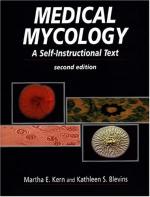|
This section contains 565 words (approx. 2 pages at 300 words per page) |

|
Mycology is the study of fungi, including molds and yeasts. The study of mycology encompasses a huge number of microorganisms. Indeed, just considering molds, the estimates of the number of species ranges from the tens of thousands to over 300,000.
Fungi are eukaryotic microorganisms (eukaryotes have their nucleic material contained within a membrane), which can produce new daughter fungi by a process similar to bacteria, where the nuclear material replicates and then the cell splits to form two daughter cells, or via sexual reproduction, where nuclear material from two fungi are mixed together and the daughter cells inherit material from both parents. Growth of fungi can occur either by the budding off of the new daughter cells from the parent or by the extension of the branch (or hyphae) of a fungus.
The study of fungi can take varied forms. Discovery of new fungi and their grouping with the...
|
This section contains 565 words (approx. 2 pages at 300 words per page) |

|


